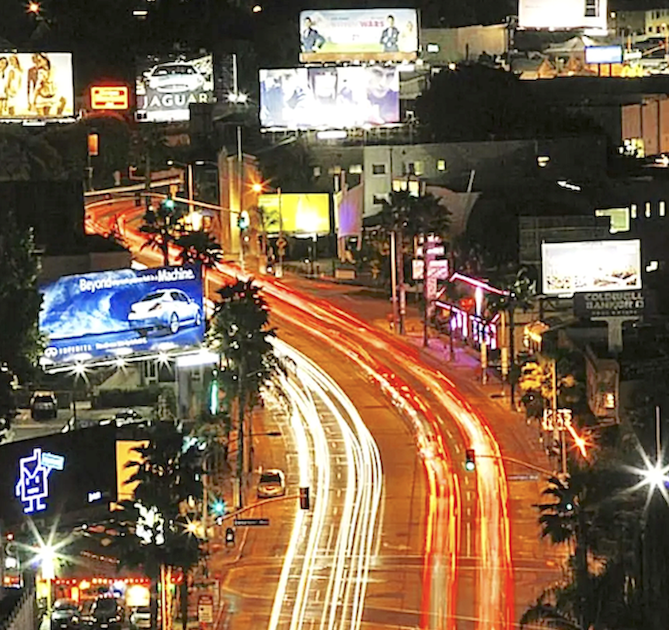
Sunset Boulevard as it snakes through West Hollywood
By MaryKate Keevins
Sunset Boulevard, a 22-mile winding stretch of road, traverses a dozen neighborhoods of Los Angeles and two independent cities. It runs from just north of downtown in urban Chinatown to the ocean bluffs of Pacific Palisades. Los Angeles can’t truly be defined by its busy freeways. You have to take an offramp down to the boulevards, avenues and streets where cars, bicycles, scooters, and pedestrians mingle to fully appreciate the geography and demography of America’s second-largest city.
Beginning in the east, through Chinatown, Echo Park, Silver Lake, and East Hollywood, the streets feel local, the pedestrian crowd of young professionals and elder immigrant communities shape the drive lined with local cafes and hipster bars. Moving centrally through the glitz and glamour of tourists in Hollywood, there are trendy restaurants, gaudy souvenir shops, and franchise staples. West of Hollywood you find yourself in, the aptly named, West Hollywood, an incorporated city that is young, diverse, and gay.
Sunset Blvd then transforms from an urban road to a mansion-lined boulevard as it meanders through Beverly Hills, Bel Air and Brentwood before arriving at Pacific Palisades’ wooded canyons, multi-million dollar homes and 180-degree vista of Santa Monica Bay.
Driving through these places you’ll see a wide variety of neighborhoods, all part of the City of Angels.
Ni Hao Chinatown
LA’s Chinatown has experienced a century of change. Displaced from its original location to make room for Union Station, the community was moved again to the foothills below what today is Dodger Stadium. But Phoenix Bakery, the oldest family-run bakery in Los Angeles, has been a part of that history every step of the way.
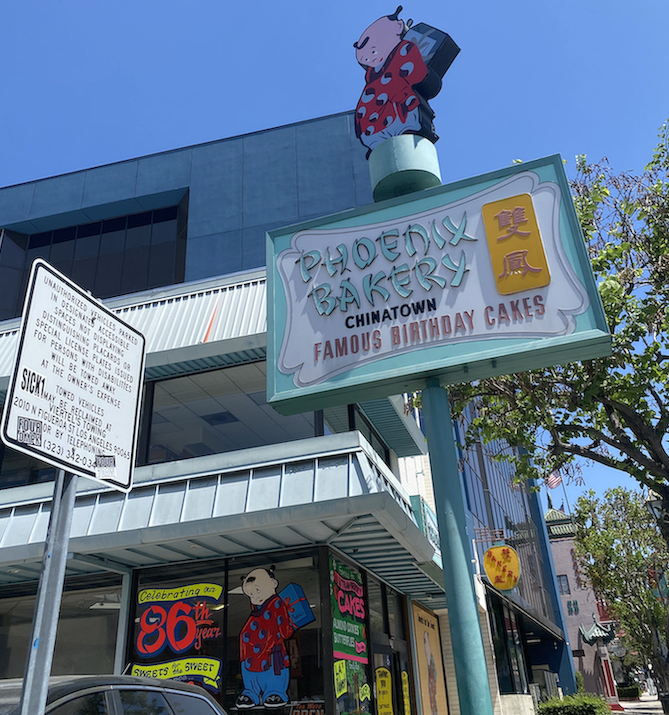
Phoenix Bakery has watched generations of Chinese immigrants move west to Beverly Hills and beyond as their businesses prosper.. Photo by MaryKate Keevins.
Founded in 1938, Phoenix Bakery has served both Chinatowns and today occupies a custom-made building on Broadway just north of downtown on the other side of the Hollywood Freeway.
“Los Angeles is an interesting city,” says Kathryn Chan Ceppi, CEO of Phoenix Bakery in LA’s Chinatown, “and I think Sunset Boulevard reflects a lot of it.”
Along with her brothers, Chan Ceppi runs the bakery’s business side while her cousins manage the kitchen. “As soon as we were old enough to help, we were down at the bakery,” she says, adding that family ties brought her and her siblings back home even after they earned advanced degrees.
Phoenix Bakery is more than just a place to buy almond cookies, sugar butterflies and their staple, strawberry cake. It’s an institution that obtained the first charter for an Asian-owned bank. “My father’s success allowed the Chinese American community to grow, prosper and become the place you went to have dinner, walk around and shop.”
Chinatown’s progress has been uneven. Many recent Asian immigrants bypass the area to settle in Monterey Park or the San Gabriel Valley in northeast LA County. But even with its hardships, Chinatown is growing rapidly. New restaurants, bars, and apartment complexes are opening. There even is a Chinatown station on the proposed aerial tramway linking Union Station with Dodger Stadium.
Chan Ceppi is not worried about the future. “This is LA,” she smiles. “If you get a good scene going, people are going to drive to it.”
Sawasdee Thai Town
With downtown LA and Chinatown in your rearview window, drive west on Sunset and you’ll quickly arrive in East Hollywood, LA’s third densest neighborhood, that’s known for funky stores, ethnic restaurants and old movie studios. Gentrification is becoming a dirty word in Los Angeles, at least in the barrios bordering downtown. But one area not likely to change is Thai Town, a cultural and business haven for the Thai-American community, that received its formal designation in 1999. Situated along Sunset and Hollywood Boulevards between Normandie and Western Avenues, Thai Town welcomes locals and tourists alike to streets lined with Thai restaurants, shops, and businesses, along with Armenian bakeries that share its space in Little Armenia and eateries associated with its large Latino population as well.
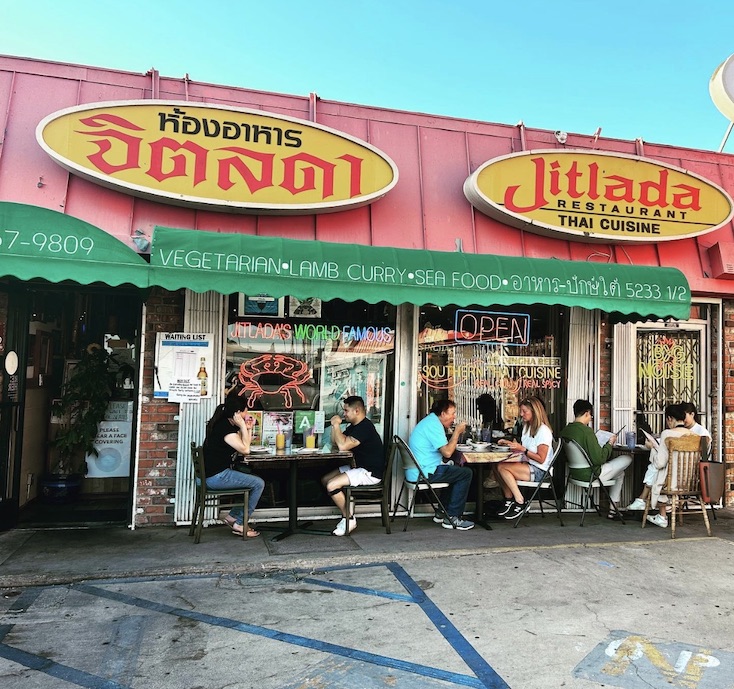
Jitlada restaurant-goers enjoy Thai food outside the storefront on a warm Los Angeles summer afternoon. Photo courtesy of Sarintip Singsanong
A hallmark of Thai Town is the family-run, Jitlada, a restaurant located in the Sunset Shopping Center that opened in the late 1970s with a unique and authentic Southern Thai style. Its co-owner Sarintip “Jazz” Singsanong says her long-term success comes from her cooking philosophy — “Cook with love and love to cook” – and the relationship she tries to build with every visitor. Says Singsanong: “People come to eat and for the family support and we keep connections with our regular customers.”
Singsanong came to the U.S. from Thailand in 1979 and has stayed in LA ever since because of her belief in the unique culture of Los Angeles. “LA is the only place in the U.S. that all kinds of international people and the food brought from their home countries.”
And Jitlada knows its food is good, having been featured on Diners, Drive-ins, and Dives and The Migrant Kitchen.
“Lots of music and movie stars come because they love Thai food,” explains Singsanong. “New Yorkers come too, and often ask to take my picture after their meal.”
But this widespread attention does not stop Jitlada from keeping their focus local. “We join local foundations in giving back to the community,” she says. “When we are asked for free food, we give it. We want to be known for our charitable giving and the relationships it builds. We pray and go to the Buddhist Temple here, so I know that when you do a good thing, it comes back to you.”
While Los Angeles’ East Hollywood neighborhood may be changing, Thai Town provides a stability in its people, culture, and food that any local or visitor can appreciate and enjoy year after year.
Welcome to WeHo
West Hollywood is a small, dynamic municipal enclave almost completely surrounded by the City of Los Angeles. It was incorporated as a city in 1984 to slow the perceived discrimination confronting WeHo’s 40% LGBT population.
This progressive culture lives on today in the spirit of its residents and its businesses. The famous “Sunset Strip” lies in West Hollywood with its upscale restaurants and fabled Hollywood haunts like the Rainbow Bar & Grill, the Roxy Theater, Whisky a Go Go, Chateau Marmont and the Sunset Tower.
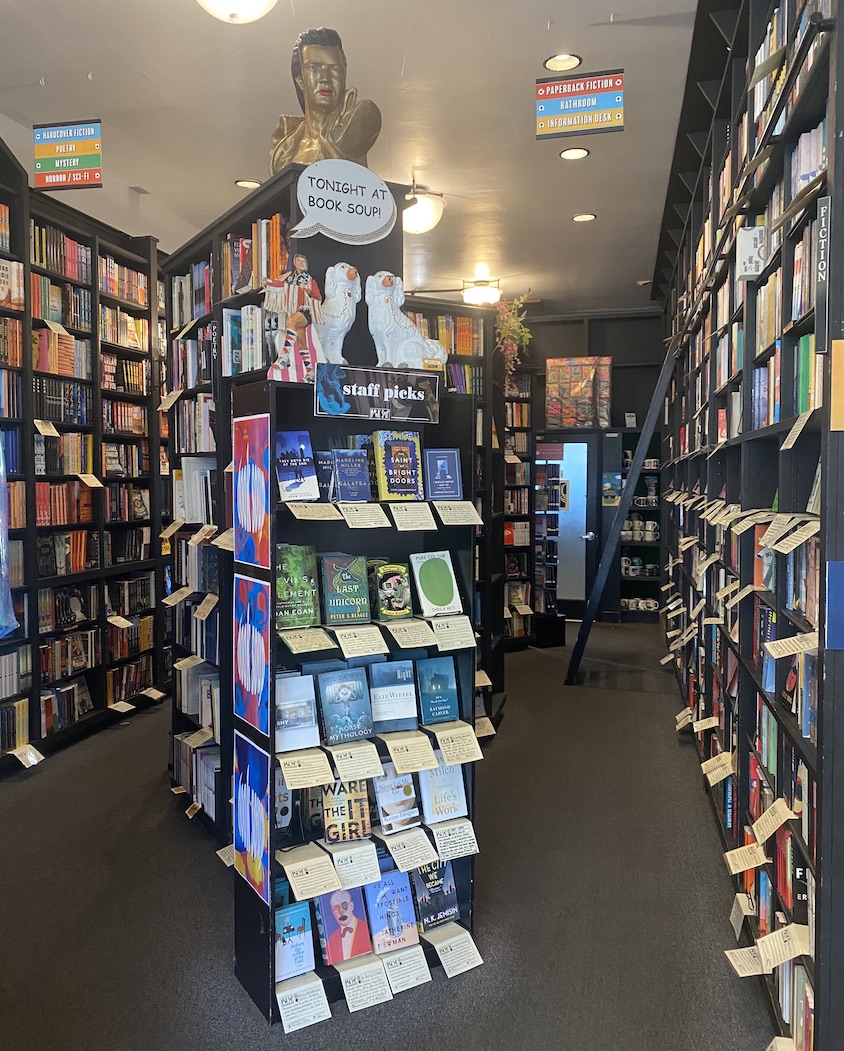
Floor-to-ceiling bookshelves, with Book Soup employees’ reviews and recommendations on notecards below the displays. Photo by MaryKate Keevins
Nowhere else does that spirit live larger than at Book Soup. “We do West Hollywood programming like WeHo Reads, says Dan Graham, Book Soup’s, Assistant Promotional Director. “We are the bookstore for other businesses in the area. We’re active in the community and want to be a presence here.”
Book Soup was founded in 1975 and currently carries over 60,000 titles on its floor-to-ceiling shelves. Operating by its tagline, “Bookseller to the great and infamous,” it embraces its unique clientele and prime location on the Sunset Strip.
“There’s a younger and more diverse group of people than in the past,” says Graham: “We want to look like the neighborhood we’re in, and we buy to reflect that.”
Book Soup is a testament to the nature of West Hollywood. It has adapted to changing times while maintaining its own identity. “We’re in a great spot and can’t imagine being anywhere else,” says Graham.
“It’s the great thing about LA,” says Graham. “Sunset Boulevard stretches from the Pacific Ocean to the Hispanic immigrant community of Boyle Heights. The street changes constantly and is full of activity no matter if it’s day or night.”
Pacific Palisades Sunsets
As you near the end of the long drive west along Sunset Boulevard, streets lined with storefronts and pedestrians shift to green medians and trees. Beyond Beverly Hills, past UCLA and the gated neighborhoods of Brentwood lie the undulating hills of Pacific Palisades. The Palisades draw LA millionaires looking to find a more rustic alternative to Santa Monica and Malibu a few miles away.
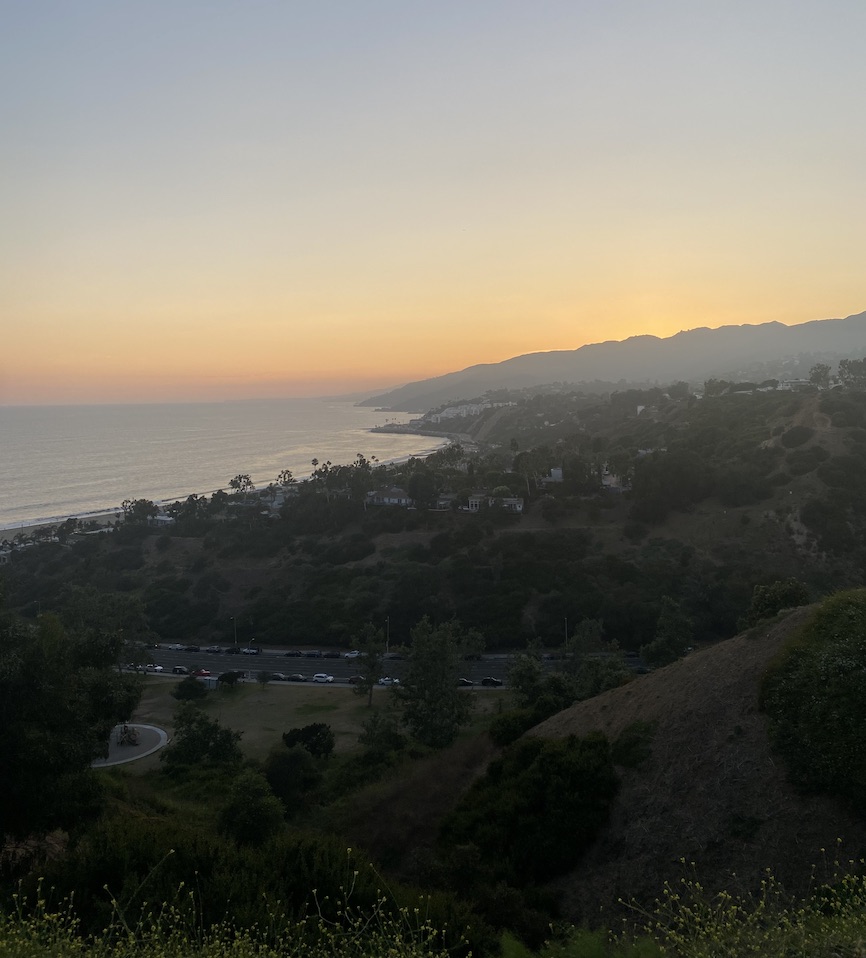
Twenty-two miles is not a long distance, but it can take an immigrant family decades to travel from the start of Sunset Boulevard in East Los Angeles to the million-dollar estates of Pacific Palisades. Photo by MaryKate Keevins
The oldest business remaining in the Pacific Palisades is Palisades Barbershop, owned and operated by its long-time steward Joe Almaraz, who joined as an employee in 1962 and gained ownership in 1980. In addition to its long history, the barbershop is the focal point of the town. Almaraz says, “I think the barbershop is almost like the center of the village, especially years ago when there were a lot of mom-and-pop businesses.”
Though there have been many changes, Almaraz loves his home community and, while understanding the reasons for the changing demographics, he can see why so many people would want to join it. He says, “It’s a beautiful community. People are moving out because they’re retiring and then younger people move here, they have good jobs.”
While Almaraz has seen his community change over the past 60 years, he’s not sure what his future will be, but he will always be a part of the Palisades.
Traveling through Los Angeles via Sunset Boulevard is traveling across a tapestry of people and places that cannot be defined by any term other than, perhaps, Angelenos. The population of LA is a collection of locals, transplants, and tourists that combine to enrich the lives of everyone who lives here. From the plazas of Chinatown, the hole-in-the-wall eateries of Echo Park, the feasts of Thai Town, the allure of Hollywood, the spunk of WeHo, the luxury of Beverly Hills, and the bluffs of Pacific Palisades; each together and alone make up the heart of Los Angeles. To travel Sunset Boulevard is a way to truly see LA and discover the city that 3.9 million people call home.![]()
MaryKate Keevins is a student at Syracuse University studying Television, Radio, and Film and Political Science.

